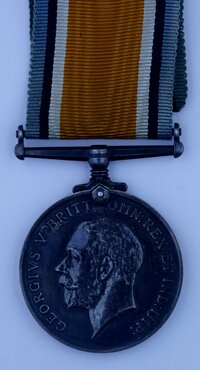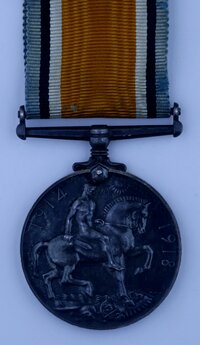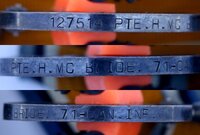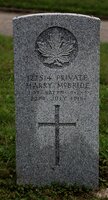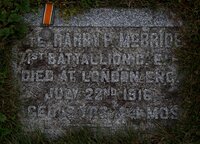
127514 Private Harry McBride
71st Canadian Infantry Battalion
By: Capt (ret'd) Michael M. O'Leary, CD, The RCR
Harry McBride was born in Toronto, Ontario, on 10 Mar 1899. McBride's family, led by parents Frederick and Elizabeth, can be found in the 1901 and 1911 Canadian Censuses. The two appearances of the family, although there are not unexpected differences in the recording and transcription of names, show that Harry was the second of three children. An older brother, Alex, did not survive infancy and Harry's younger sister Ida was born in 1906.
McBride attested for service in the Canadian Expeditionary Force (C.E.F.) with the 71st Overseas Battalion at Woodstock, Ont., on 30 Oct 1915. While he was still only 16 years old, he gave his birth date as 10 Mar 1897 to get past the recruiters. With his trade noted as Student, McBride was described on his attestation paper as 5 feet 8 ½-inches tall, weighing 134 pounds, with a 33-inch chest, a dark complexion, brown eyes, and dark brown hair. His religious denomination was Methodist. McBride identified his mother, Elizabeth McBride, 559 Hatch St,, Woodstock, as his next of kin. Having been found fit for service by Capt. G. Beverly Welford, C.A.M.C., of Woodstock, McBride was attested with the 71st Battalion and was given the C.E.F. service number number 127514.
The 71st Battalion, C.E.F., was mobilized at and recruited in Woodstock, Ont. Authorized on 15 Aug 1915, the battalion embarked for Great Britain on 1 Apr 1916 when it sailed aboard the S.S. Olympic. The 71st Bn provided reinforcements to the C.E.F. until 30 Sep 1916, at which time its remaining personnel were absorbed by the 44th, 51st, 54th and 74th Battalions.
While the unit trained at Woodstock, McBride had two encounters with the military's justice system. He was absent without leave from 18 to 23 Jan 1916 and again the following month from 7 to 11 Feb 1916.
The 71st Battalion arrived in England on 11 Apr 1916. Little more than two weeks later, on 27 Apr 1916, McBride was admitted to the Isolation Hospital at Aldershot, with Rubella. After three weeks in the Isolation Hospital, McBride was discharged on 17 May 1916.
Commencing Apr, 1916, McBride established a monthly Pay Assignment of $25 to be sent to his mother. The following month, he changed the amount to $20. As a Private in the C.E.F., McBride was paid $1.00 per day plus an additional ten cents daily field allowance. His pay assignment represented about two-thirds of his monthly pay.
The parcelling out of the soldiers on the 71st Battalion in drafts to other units drew McBride into the reinforcement system on 28 May 1916. He was transferred to the 44th Battalion.
The 44th Battalion (Manitoba), C.E.F., was authorized on 7 Nov 1914 and embarked for Great Britain on 23 Oct 1915. In the spring and early summer of 1916, the battalion was preparing for its move to France in August, 1916, as a battalion of the 10th Canadian Infantry Brigade in the 4th Canadian Division.
On 12 Jun 1916, Harry McBride completed the Military Will form in his soldier pay Book. Recording his unit at that time as the 44th Battalion, his will statement reads: "In the event of my death I give the whole of my property to my mother, Mrs. F.C. McBride, 559 Hatch St., Woodstock, Ontario, Canada."
McBride would not stay with the 44th Battalion for very long. On 30 Jun 1916, he was transferred to the 51st Battalion which was functioning as a Reserve battalion, assembling and providing drafts of soldiers for units in France.
Taken on the strength of the 51st Battalion from the 44th Battalion on 1 Jul 1916, McBride would move again ten days later. On 11 Jul 1916, he was attached to the Pay Office, London, for "D.D.R.C and Pay" (discipline, duty, rations, clothing, and pay).
McBride fell ill on or about 16 Jul 1916. Four days later, on 20 Jul 1916, he was admitted to the Military Hospital, Endell St., London. His condition and diagnosis were summarized as "seriously ill, appendicitis and pneumonia."
With a worsening condition, a cable was sent to McBride's parents on 22 Jul 1916. It read "Seriously ill at Military Hospital Endell St., London, July 22nd, 1916. Appendicitis, Pneumonia complications."
On 22 Jul 1916, Private Harry McBride died at Endell St Military Hospital. McBride's case notes, written and signed by Dr. J. Murray, include the following:
"Ill 7 days. Admitted with appendicitis and condition bad. Operation 20/7/16. Long appendix with concretions removed, operation easy. On 21/7/16 he developed right basal pneumonia. At 8 p.m. that night his temperature = 105° and he was delirious.
"He developed a purpuric [i.e., purple] rash and some pustular spots and became unconscious on the morning of the 22nd.
"Died 7 p.m. 22/7/16.
"Post Mortem Exam. Septic vegetations [i.e., abnormal growths] on both valves of the heart. The purpuric spots were found in the lungs, kidneys, and intestines. There was an area of consolidation in the right lung and severed infarcts in the kidneys.
"Cause of Death. Malignant endocarditis [i.e., rapidly fatal inflammation of the inner lining of the heart] associated with appendicitis and pneumonia.
"J. Murray."
Established by suffragette doctors Flora Murray and Louisa Garrett Anderson, Endell Street was the third hospital run by these doctors after operating smaller facilities in Paris and on the coast of France before returning to England. Starting and running their first hospitals in the face of official opposition from the Army Medical Corps establishment, despite the need, they were eventually asked to open a hospital in London in 1915.
In England, Murray and Anderson organized and ran Endell St. Military Hospital. Occupying a derelict workhouse on Covent Garden's Endell Street, the facility was staffed entirely by women and expanded to 573 beds at its peak. The doctors executed cutting-edge medical practices and the hospital swiftly gained a reputation for being one of the best medical facilities in England for wounded and convalescing soldiers.
In the blunt notes recorded by the military, McBride's death was noted by his parent unit: "Having died, is struck off the strength of the 51st Battalion."
On 23 Jul 1916, a second cable was sent to McBride's parents in Woodstock, Ont. It informed them that their son had "Died at Military Hospital Endell St., London, July 22nd, 1916 (Malignant endocarditis appendicitis)."
In its edition of 25 Jul 1916, The Toronto World included a list of Canadian Casualties. Among the names they identified as from the "Midnight List" and "Infantry, Killed in Action" the paper erroneously included "127514, Harry McBride, Woodstock, Ont." Publishing the same date, The London Advertiser correctly listed McBride's name under "Died."
On 31 Jul 1916, The Toronto World showed that the accuracy of its reporting had not much improved. In a casualty list published that date they included under "Seriously Ill" the name of "127514 Pte. H.H. (sic) McBride, Woodstock, Ont."
McBride's name would appear once more in the pages of The Toronto World on 18 Aug 1916. The paper reported:
"Returned Soldiers Acted as Pallbearers
"Funeral of Pte. McBride, Who Died in England, Held at Woodstock Yesterday.
"Special to The Toronto World.
"Woodstock, Ont., Aug. 17.— Early in the spring Private Harry McBride left Woodstock with the 71st Battalion for England. A few weeks ago he was afflicted with appendicitis, pneumonia followed and he died.
"Today his body arrived in Woodstock, and this afternoon the remains were interred in the Methodist Cemetery. The pall bearers were two returned soldiers and four others, members of different units now in training in the province."
During the First World War, there was an official policy that the bodies of soldiers who died overseas would not be repatriated to Canada. This policy was strictly adhered to in the case of soldiers who died in the theatres of war, primarily in France and Flanders for Canadians. In one relatively high profile case, the Becher family of London, Ont, even with the initial support of Sam Hughes, was unable to bring home the body of Lieut.-Col. Henry Campbell Becher who died at Givenchy on 15 Jun 1915 while serving with the 1st Canadian Infantry Battalion.
When soldiers died in England, the restrictions on repatriation were not as strictly observed. It was possible for families with the means to bring home the bodies of their fallen sons. While this was not a common occurrence, in a thread on the Canadian Expeditionary Force Study Group (CEFSG) forum, one member had, in 2008, identified the names of 59 repatriated soldiers with another 20 to research for confirmation. The member's list at that time did not include McBride's name.
For his service in the C.E.F., having only served overseas in the United Kingdom, McBride was entitled to receive the British War Medal. This medal was despatched to his mother at 751 Water St., Peterborough, Ont., on 8 Apr 1922. McBride's parent also received a Memorial Plaque and Scroll and Elizabeth McBride was the recipient of a silver Memorial Cross. The plaque and cross were despatched in 1921.
An underage soldier of the C.E.F., Private Harry McBride is one of the few Canadians who died overseas in England during the Great War and was repatriated by his family to be buried in Canada. He rests in the Hillview (United Church) Cemetery in Woodstock, Ont.
Pro Patria
Visit a randomly selected page in The O'Leary Collection (or reload for another choice):
- The O'Leary Collection; Medals of The Royal Canadian Regiment.
- Researching Canadian Soldiers of the First World War
- Researching The Royal Canadian Regiment
- The RCR in the First World War
- Badges of The RCR
- The Senior Subaltern
- The Minute Book (blog)
- Rogue Papers
- Tactical Primers
- The Regimental Library
- Battle Honours
- Perpetuation of the CEF
- A Miscellany
- Quotes
- The Frontenac Times
- Site Map
QUICK LINKS
The O'Leary Collection—Medals of The Royal Canadian Regiment
Newest additions:
![]()
![]() SB-12725 Private Henry "Hank" Ard
SB-12725 Private Henry "Hank" Ard ![]()
WIA at Hill 187, Died of Wounds in Japan
![]()
![]() 2355331 Lance Corporal Albert Lorking
2355331 Lance Corporal Albert Lorking
Wounded in action, later a War Amps representative.
![]()
![]() 4334 / 477996 Pte Isaac Hamilton Wilcox
4334 / 477996 Pte Isaac Hamilton Wilcox
Permanent Force, South Africa, and C.E.F.
![]()
![]() 477019 Private Harold Ashcroft
477019 Private Harold Ashcroft
Transferred to the Tunnelers.
![]()
![]() 734231 Private Clark D. Thompson
734231 Private Clark D. Thompson ![]()
The older Thompson brother, killed in action.
![]()
![]() 733849 Private Norman Parker Thompson
733849 Private Norman Parker Thompson
The younger Thompson brother; post-war service in the Special Guard.
![]()
![]()
![]() A305 / 400305 Private Andrew Walker
A305 / 400305 Private Andrew Walker ![]()
"Previously reported Wounded, now Killed in Action."
![]()
![]() 823298 Pte Thomas Patrick Steele, M.M.
823298 Pte Thomas Patrick Steele, M.M. ![]()
… for gallant conduct in the field …
![]()
![]() P13066 Sergeant Harold Thompson
P13066 Sergeant Harold Thompson
Instrumental Soloist for over 20 years of Canadian Army service.
![]()
![]() 9609 / 477728 Private Albert Edward Piper
9609 / 477728 Private Albert Edward Piper
"Arrived from England as a STOWAWAY …"

